
Freshfel Europe Headlines – Edition 4, 2022
Freshfel Europe’s Headlines publication provides an overview of the Association’s most recent activities.
For more information about Freshfel Europe’s activities please contact the Freshfel Europe Secretariat.

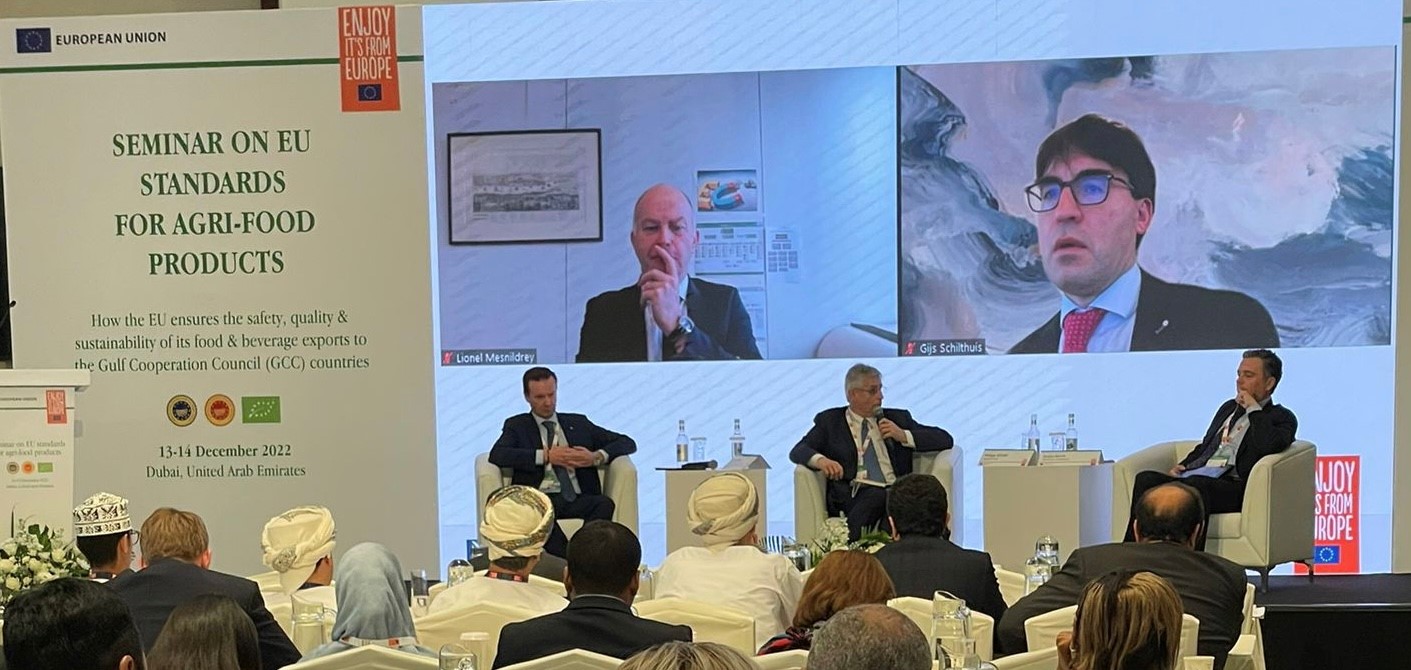
Freshfel Europe discusses fruit & vegetable exports to the Gulf region
Freshfel Europe General Delegate Philippe Binard attended the Seminar on EU exports of agri-food products for the Gulf Cooperation Council (GCC) countries representing the fruit and vegetables in different session of the events in mid-December in Dubai. The latest trade developments of EU fresh produce exports to the regions and the assets of quality and safety to strengthen the position of fresh produce in the high-quality segments of those markets were reviewed. The EU exports 250.000 to 300.000 T to the Gulf countries regions, the main destinations being Saudi Arabia and the Emirates. The main suppliers from the EU include Spain, Italy, The Netherlands, France and Poland. Lead exported products are apples and pears, oranges, kiwifruit, kaki and onions.
The meeting was coordinated by the European Commission DG AGRI with additional participation of DG TRADE and DG SANTE as well as the EU delegations in the region and several Member States. The seminar is part of Commission activities in the region to highlight the quality of European Agriculture products and enhancing their features and that European food is more than food to be enjoyed from Europe. It also focused on a greater harmonization of rules among the 6 countries of the Gulf Cooperation Council to facilitate trade for EU agrifood export.

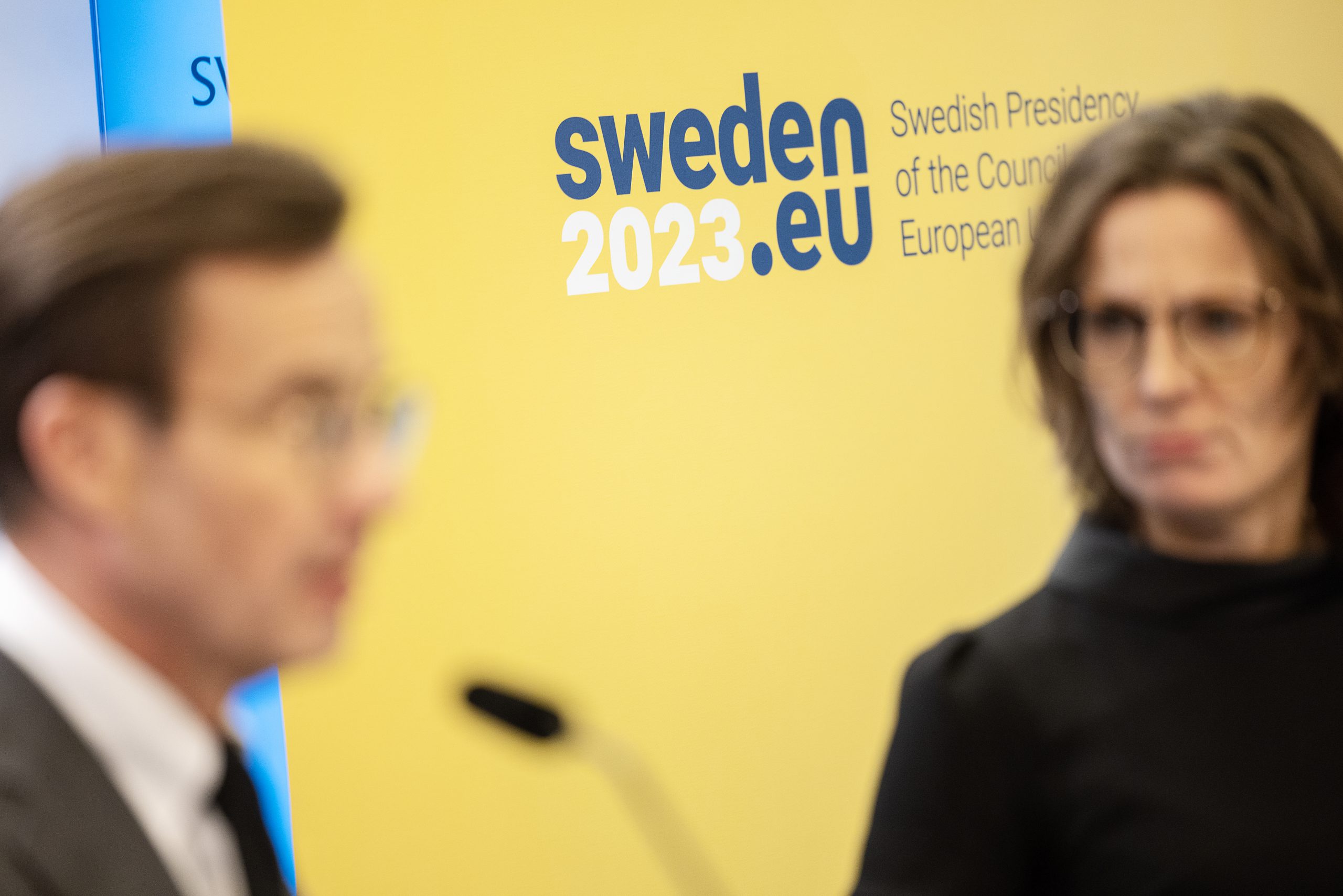
Freshfel Europe continues its work with the rotating presidency of the EU
Continuing the work laid out in September in the meeting between Freshfel Europe and representatives from the Czech Presidency, Freshfel Europe has begun its engagement with the Swedish EU representatives. In early December, Freshfel Europe’s General Delegate Philippe Binard, together with Director of Food Quality & Security Eglė Baecke and Policy Advisor International Affairs and Communication Joanna Nathanson, met with Sweden’s counsellor to the Special Committee on Agriculture. The meeting served as an initial point of contact to brief the Swedish representation on the position of the fresh fruit and vegetables sector as well as to exchange views on upcoming priorities and the Council presidency program. The delegation from Freshfel Europe highlighted that ensuring safe and sufficient production is fundamental for food security and food safety in Europe. Freshfel Europe will seek to further engage with the Swedish Presidency, and to reiterate the potential held by the fruit and vegetables sector in reaching the goals of the main EU strategies and to ensure competitiveness of European produce.

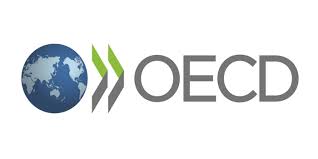
Freshfel Europe speaks at 81st Plenary Meeting of the OECD Fruit & Vegetables Scheme
The OECD Fruit and Vegetable Scheme held its 81st Plenary Meeting in Paris on the 1 December. The Plenary Meeting was held under celebratory circumstances, as the Fruit & Vegetable Scheme is celebrating its 60th anniversary this year. The OECD Fruit & Vegetables Scheme is one of the OECD’s tools to facilitate international trade through standardized and uniform classifications and quality control procedures. Freshfel Europe, represented by Policy Advisor Joanna Nathanson, was invited to give two presentations. The first focused on the activities and priorities of Freshfel Europe over the last year, as well as a forward look into the coming year. The presentation also highlighted Freshfel Europe’s increasing online presence, and collaboration with other organizations and institutions, for instance the work with the Czech Presidency and the methodology for the shadow Product Environmental Footprint.
In the second presentation, Freshfel Europe illustrated the various risks that fresh fruit and vegetables are facing against the backdrop of the war in Ukraine and the contracting toolbox for safeguarding safe and sufficient production of fruits and vegetables in Europe. Freshfel Europe emphasized how so far multiple crises have been well mitigated by the sector, which has shown great resilience, but ultimately food safety and food security is at risk. In conclusion Freshfel Europe underlined the unique position of the fresh fruit and vegetables sector as part of the solution not only to reach goals of main EU strategies, but also to several of the UN Sustainable Development Goals. The Plenary Meeting also included presentations from the UNECE, COLEACP, Codex Alimentarius Commission and an OECD study on Brexit.

Freshfel Europe holds event with members & the European Commission on issues exporting to EU neighbourhood
Freshfel Europe’s Secretariat, several of its members, and representatives from the European Commission’s DGs AGRI, TRADE and SANTE and the EU delegations in Egypt, Mongolia and Kazakhstan held a webinar to discuss the export of fresh produce to the EU’s neighbourhood, particularly Egypt, Belarus and Central Asia. In the meeting, Freshfel Europe and its members highlighted how EU-based fresh produce producers have faced both greater competition from new suppliers in its neighbourhoods (like Serbia or Moldovan producers) and had to deal with the closing of important export destinations, like Belarus or Algeria, requiring additional export diversification. Concerning Egypt, the discussion focused on the issue of letters of credit, which have restricted or blocked exports to the EU’s fourth most important fresh produce export destination. As a result of the trade restrictions, it was becoming almost impossible to export ‘legally’ to the country, empowering less reputable actors. The sector urged the European Commission to tackle the problem.
The European Commission responded that they would closely follow the situation and explained that Egypt would likely lift the requirement once it reached an agreement with the IMF in late 2022. On the topic of Belarus, Freshfel Europe members stressed that due to the embargo and the sanctions, exporting to Belarus had become near-impossible and risky and had resulted in an enormous trade collapse, as members expected to act in ‘survival’ mode. For Central Asia, the participants highlighted that Kazakhstan and Mongolia represented promising markets, although high transit and transport costs and the risk of passing through Russian customs had impaired growth.
The European Commission was receptive to the need to facilitate trade with Central Asia but noted that any improvements in the situation for Belarus depended on the geopolitical situation. Freshfel Europe General Delegate Philippe Binard recalled that the EU’s exports to its eastern and southern neighbourhoods represent a traded volume of about 600,000 tonnes, representing 30% of all exports, and urged the European Commission to protect and boost EU exports. The participants agreed that boosting exports to the Middle East was key to diversifying away from the Eastern Neighbourhood and recommended organising promotion events in Egypt and Turkey. Freshfel Europe followed up on the meeting with a letter addressed to DG AGRI outlining the issues discussed.

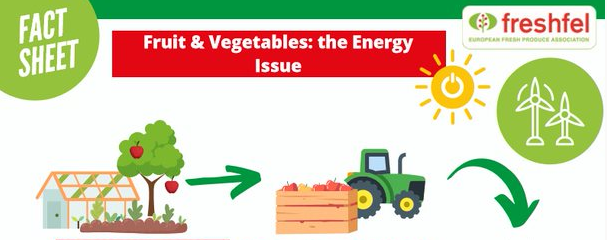
Freshfel Europe hosts webinar on the impact of the energy crunch on fresh fruit & vegetables
On 7 October Freshfel Europe organised a webinar for its members to inform and exchange views on the impacts of the high energy costs on the fresh fruit and vegetable sector. The webinar explained that the playing field is uneven on several levels, creating distortions on the Single Market and in supply chains. The webinar discussions highlighted the necessity of positioning fruit and vegetables as essential goods, exempting them from certain costs and obligations and allowing for long-term fixed price energy contracts. There is also a will to become more self-reliant in energy production and a demand for further facilitation for investments in renewable energy solutions for own usage. Rising energy costs have also had a negative impact on consumption, as consumers are forced to spend a larger part of their income on their energy bill. It is therefore crucial to promote the benefits of consuming fresh fruits and vegetables, and to promote the positive image of fresh produce as an affordable and healthy food option.

Freshfel Europe holds webinar on food additives
On 12 December Freshfel Europe, Eglė Baecke organised a webinar on food additives. During the webinar Freshfel Europe provided an overview regarding existing authorisations and pending applications. Freshfel Europe has also revised the rules of uses of food additives in organic produce as well as presented European Commission’s viewpoint regarding the use of vegetable and other plant origin extracts which in constituents are performing a technological function. Guest speakers from Eurofins laboratory presented its analytical perspective regarding testing methodologies for food additives in fresh produce.
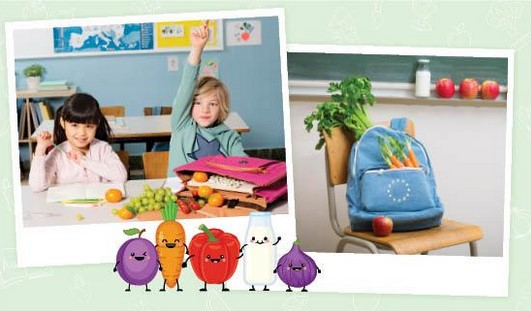
Freshfel Europe outlines perspective for the Fruit and Vegetables School Scheme
On 24 November Freshfel Europe General Delegate Philippe Binard presented the European sector’s perspective for fruit and vegetables at the ‘An EU School Scheme Fit for the Future’ conference for Member States, organized by the European Commission. Today, close to 17 million children have access to the School Scheme, based on a policy with a €130 million EU budget, sometimes topped up by additional resources from national budgets. The EU budget allows for the yearly distribution of around 70.000 T of fresh fruit and vegetables every school term.
Reviewing the economic aspects of the Scheme, Freshfel Europe stressed the value of continued implementation as well as areas in need of improvement to ensure the equal, efficient, and educational distribution of fresh fruit and vegetables to European school children. The daily consumption of fresh fruits and vegetables in the EU is still well below the WHO minimum recommended intake of 400g per day. The lowest consumption levels are being seen among children and young adults, many eating at best only 200g per day, sometimes even less.
Freshfel Europe highlighted that the School Scheme should stick to its health and nutritional value, and that educating the youngest is key to reverse increasing obesity rates, and to move children towards a healthier diet for their future. Freshfel Europe also reiterated that the School Scheme is not a withdrawal scheme for low quality products but ensures delivery of quality produce. The primary economic benefits for the sector are long-term, with indirect but essentials effects for the fresh produce sector and society. It contributes not only to a number of the UN’s Sustainable Development Goals, but also to EU strategies such as the EU Green Deal, the Farm to Fork Strategy and the EU Beating Cancer Plan. Freshfel Europe underlined that the School Scheme is an essential long-term investment, based on fruit and vegetable distribution mechanisms with educational tools. To maximize its return on investments Freshfel Europe identified some key priorities and recommendations for the further growth and efficiency of the Scheme within the upcoming reform.

Freshfel Europe at the WTO workshop of the SPS Committee
On 8 November Freshfel Europe participated in the thematic session of the WTO SPS Committee in Geneva to speak about practical problems with phytosanitary conditions. At the meeting, Freshfel Europe called for the meticulous implementation of the WTO SPS and Trade Facilitation agreement principles. Freshfel Europe questioned the numerous ongoing SPS barriers faced by European fresh produce exports for market access due to difficulties and burdens in negotiating the opening of new markets. Too many third countries ignore the basics of the WTO SPS and TFA rules and set out unrealistic requirements, which, combined with a lack of international IPPC standards, prevents trade development.
Freshfel Europe proposed to the WTO members and WTO and IPPC secretariat several short- and long-term actions to address this situation. The proper implementation of the spirit and the letter of the SPS agreement and the vast use of the IPPC would significantly improve the market access process. Freshfel Europe called on the WTO members for better compliance with those principles. Moreover, a simplification of the negotiation process by extending to other Member States existing provisions already agreed with some EU Member States or the bundling of requests for EU products featuring similar or identical risk profiles are some of the additional proposals which could alleviate both costs and the lack of sufficient human resources. Further use of digitalisation would also be an asset for e-phyto or visio-inspection. In the long term, a series of science-based international standards should be set up by IPPC for the most common pests to facilitate the negotiation process. Freshfel Europe calls on those with governance responsibility in WTO and IPPC to take responsibility to move forward.
The European fruit and vegetable sector is committed to safe trade as a prerequisite for sound and sustainable production. However, Freshfel Europe warned that the current principles of the WTO SPS and Trade Facilitation agreements failed to deliver concrete results. This situation generates an unlevel playing field between WTO members depending on whether they have open or closed SPS market access systems.
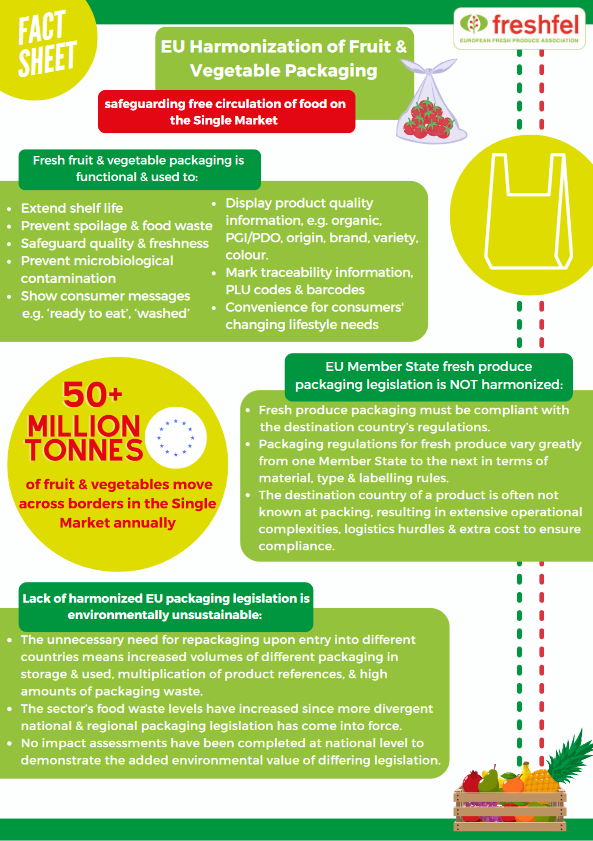
Freshfel Europe calls for sustainable & functional harmonized EU packaging rules for fresh produce
Freshfel Europe, led by Director Sustainability and Communications Nicola Pisano, has been engaging with the European Commission DG ENVI and DG AGRI services regarding the European Commission’s proposal for a Regulation on packaging and packaging waste (PPWR) for some years. Now, following the release of the European Commission’s proposal Freshfel Europe is calling on decision-makers to enact sustainable and functional harmonized EU packaging rules for fresh fruit and vegetables. The current proposal targets the fresh produce sector with disproportionate and discriminatory measures in comparison to other food sectors, banning all single use packaging for fresh fruit and vegetables. While the fresh fruit and vegetable sector is supporting moves towards more circular and sustainable supply chains, including packaging types and materials, efforts must be led through science-based solutions with true results as opposed to politically driven bans. Freshfel Europe submitted various responses during the consultation process and in the lead up to the proposal’s publication voicing the sector’s concerns. More information is available in the Association’s press release.
Additionally, on 21 October amid mounting operational complexity and costs, leading fresh produce sustainability experts gathered online on Friday 21 October for Freshfel Europe’s Webinar on ‘National Packaging Legislation’. The webinar brought to light the many difficulties the fresh fruit and vegetable sector is already facing in navigating national packaging legislation across the EU as a result of divergent Member State implementation of the Single Use Plastics Directive. The sector is increasingly frustrated that lack of EU harmonization in packaging rules on the Single Market is hindering sector sustainability efforts, both on an environmental and economic basis. Freshfel Europe is calling on the EU institutions to ensure a higher level of EU harmonization in the PPWR. More information about the webinar is available in the Assocation’s press release.
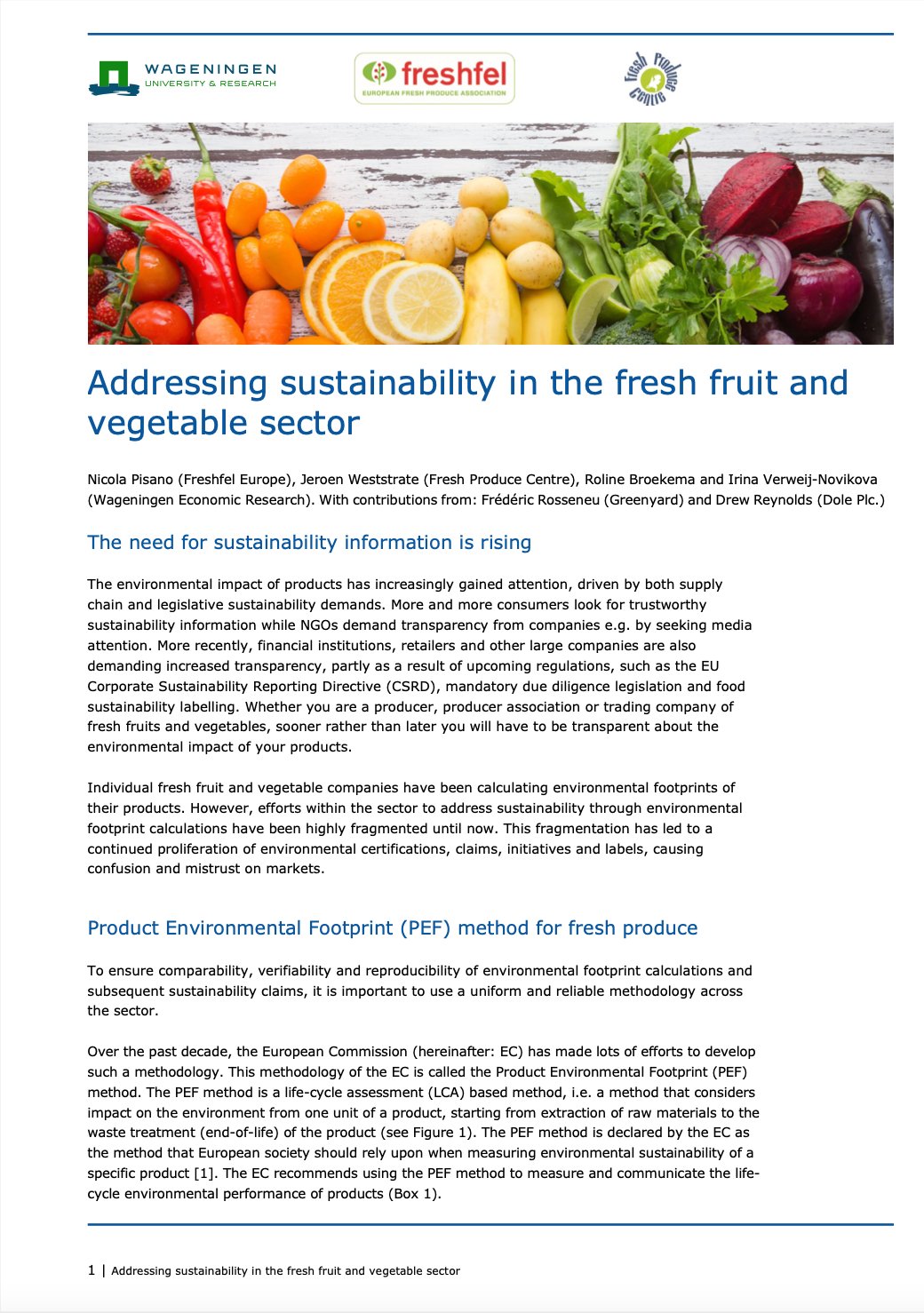
Freshfel Environmental Footprint Initiative embarks on shadow PEFCR for fruit & vegetables
As part of the work of the Freshfel Environmental Footprint Initiative, Freshfel Europe alongside members is embarking on the development of a shadow Product Environmental Footprint Category Rules (PEFCR) for fruit and vegetables. The objective of the shadow PEFCR is to have a state-of-the-art, standardized environmental footprint methodology for the fresh produce sector. Once developed, the shadow PEFCR will enhance benchmarking and comparison of the environmental footprint of products within the fresh produce category. This will heighten sector transparency, accountability and communication on environmental matters with fruit and vegetables being one of the most sustainable food categories.
The PEF methodology specific to the fresh produce sector will standardize environmental footprint methodology for sector calculations, facilitating higher transparency and accountability on environmental matters. The harmonized methodology will also support sector communication on the strong positive environmental assets of fresh produce consumption, with fruit and vegetables being one of the most sustainable food categories. The collaborative technical project is a key pillar of the work of the Freshfel Environmental Footprint Initiative, which launched earlier this year.
Until now efforts within the fresh produce sector to address product sustainability through environmental footprint have been highly fragmented. The development of a shadow PEFCR with specific category rules for fruit and vegetables will ensure comparable results of PEF calculations. The shadow PEFCR for fruit and vegetables will take two years to develop and will be open twice for public consultation during this period. Its development will closely follow the European Commission’s official PEFCR process to be well aligned for future approval as the EU sector standard PEF methodology. The methodology will be developed with the technical support of Wageningen Economic Research and will revise the existing HortiFootprint Category Rules for the fresh produce sector.
An explanatory fact sheet on the shadow PEFCR for fruit and vegetables, entitled ‘Addressing sustainability in the fresh produce sector’ is now available from Wageningen Economic Research. The fact sheet details information about a PEF methodology for fresh produce, legislative and sector developments around the PEF method, and the benefits of developing a PEFCR for the fresh fruit and vegetable sector. The fact sheet is available for download here. More information about the activities of the Freshfel Environmental Footprint Initiative is available here. The full press release is available here.

Crisis contingency and sustainable food systems
Freshfel Europe has been accepted as a member of two different platforms of the European Commission, the Expert Group on the European Food Security Crisis Preparedness and Response Mechanism (EFSCM) managed by DG AGRI and the Advisory Group on Sustainability of Food Systems (AGSFS) managed by DG Sante. In recent months the platform on EFSCM of DG AGRI organised valuable meetings for its members on ‘improvement of diversity of sources of supply’, ‘Dashboard for the monitoring of food supply and food security’ and ‘main drivers for food security’.
The meeting of DG Sante served as the first meeting of the newly created and launched platform which is aiming to support the swift transition of agri industry through the objectives set under the European Green Deal & the Farm to Fork Strategy. On this occasion stakeholders took the floor to briefly summarise the challenges of the sectorial industries, which was followed by a collection of written contributions.
In its contribution Freshfel Europe pointed out that the sector went through various crisis situations in the last decade, including: the Russian Embargo, Brexit, the war in Ukraine, climatic crisis and the progressive fragmentation of the Singe Market. While the sector demonstrated its ‘resilience’ and capacity to adapt to these successive crises, recent development and rising costs are putting a serious threat on the short-term economic sustainability of growers and operators in the fresh produce supply chain. The current situation is questioning the economic sustainability of an essential sector and consequently challenging other key policy objectives as well: sector competitiveness, food security, food loss, incoherence in policy (plant health, organics, plant-based diet and lack of actions).
Freshfel Europe firmly highlighted that a better recognition of the fruit and vegetable sector is needed. Fruit and vegetables should be perceived as ‘essential goods’. The fruit and vegetable sector is part of the solution to Europe’s ambitions under the EU Green Deal, Farm to Fork Strategy, EU Beating Cancer Plan and the FIT for 55 Strategy. The sector can only be ‘resilient’ against so many challenges and crises, and the GREEN Deal will not be achieved if growers are in RED figures, while the fresh produce industry is representing the agri-food sector with the lowest environmental impact and the highest health benefits.

Sustainable use of plant protection products (SUR)
Following the meeting in September with the Czech Presidency currently holding the rotating presidency of the EU, Freshfel Europe continued following the discussions between the EU Member States and the European Commission regarding the modifications to the European Commission’s proposal on sustainable use of plant protection products in the EU. As a result, Freshfel Europe met with the Swedish permanent Representation to the EU to further address remaining concerns of the fresh produce industry, among which include: lack of available solutions and technical alternatives to support the transition, administrative burdens, attractiveness of the sector, ‘sensitive areas’, etc. Freshfel Europe will explore possibilities to further discuss these important matters with the Swedish Presidency to the EU in the upcoming months.
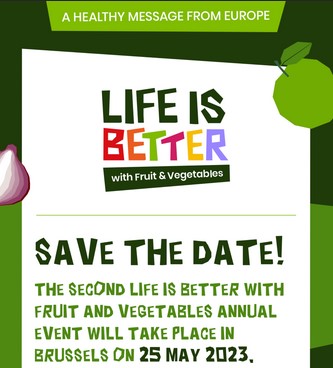
‘Life is Better with Fruit & Vegetables’: Annual Event announced for 25 May 2023
As announced in the third newsletter of the Life is Better with Fruit and Vegetables project, the second Annual Event of the campaign will take place on 25 May 2023 in Brussels. The first event saw the participation of more than 100 representatives and journalists from the agricultural sector, with market analyses and testimonials from millennial influencers regarding the eating habits of European millennials. The 2023 event will focus on the challenges of the agricultural sector to keep fruit and vegetables accessible to consumers, starting with an overview of the results from Year 1 of the campaign.
Life is Better with Fruit and Vegetables is an EU-funded program that targets Millennials and aims at increasing their level of knowledge regarding the nutritional benefits, versatility, sustainability, and practicality of fruit and vegetables. Young Europeans aged 25 to 35 represent a key demographics of consumers, as they are still shaping their purchasing and eating habits. The campaign, which was officially launched during a press conference on the occasion of Freshfel Europe´s Annual General Meeting on 18 May 2022, will run until February 2025 and will take place in France and Ireland, in addition to having a pan-European dimension. It involves Interfel, AIB, Bord Bia, and Freshfel Europe. As well as hosting the annual press conferences of the campaign, Freshfel Europe distributes quarterly newsletters to its members to update them about the activities of the campaign. The first and second newsletter of the campaign focused on the launch of the project and the press conference respectively.
